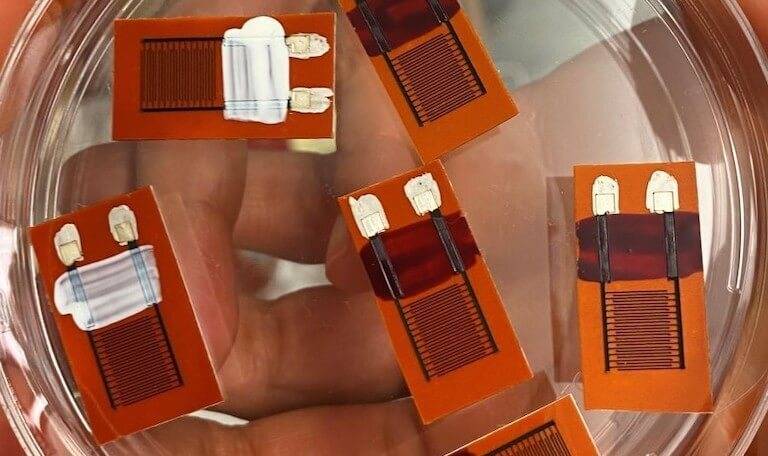SoilTech industry-university center to develop technology to measure, track soil health
Posted Mar 20, 2023

A graduate student, wrapping up a recent meeting of Jonathan Claussen’s research group at Iowa State University, reported he’s trying to get new sensors to work.
That’s a pretty good summary of the work Claussen and Carmen Gomes, both associate professors of mechanical engineering at Iowa State, have been doing for years. They’ve been inventing, making and testing sensors for agriculture, food safety and health applications.
Claussen’s lab uses heavy-duty printers to make graphene electrodes for biosensors. Gomes’ lab uses a commercial laser engraver to treat graphene and tune its properties. Visit the labs and they’ll pull out petri dishes full of their printed and laser-treated sensors.
And now their sensor work is going to be part of a coast-to-coast, industry-university research hub, the Center for Soil Technologies, or SoilTech. The National Science Foundation (NSF) recently awarded a five-year, $3 million, phase I grant to launch the center, including $650,000 for the work at Iowa State. The center can apply for another round of funding as phase I expires.
Gomes and Claussen will co-direct the center’s Iowa State site.
“These centers are industry focused,” Gomes said. “They’re about connecting industry-inspired research projects with faculty.”
Studying Soils, Supporting Industries
SoilTech is collaboration of researchers at Iowa State, the University of Southern California, the University of Connecticut and the University of Washington. Mahta Moghaddam, Distinguished Professor and Ming Hsieh Chair in Electrical and Computer Engineering at USC, is the center’s overall director.
Potential projects for the 20 affiliated researchers on the center’s campuses include:
- Iowa State researchers will work with in-field sensors for soil health, plant nutrients, carbon capture and pesticide mapping.
- USC researchers will work with sensors, data analytics and sensor networks, including drone-based networks.
- Connecticut researchers will develop sensors for real-time soil health monitoring and sensors for tracking plant nutrients and toxic contaminants.
- Washington researchers will study satellite imaging for soil observations, local area networks for precision agriculture and battery-free soil sensors.
SoilTech will be an NSF Industry-University Cooperative Research Center. The centers are to accelerate the application of basic university research to meet industry needs, enhance American innovation and develop a skilled, high-tech workforce.
To date, SoilTech has signed on 15 industry partners, most making investments of $50,000 to support the center’s research programs. The partners include companies such as John Deere, Bayer Crop Science and Corteva Agriscience. There are also government agencies, including NASA and the U.S. Geological Survey’s National Innovation Center.
SoilTech’s mission includes supporting a variety of industries, including agriculture, energy, climate adaptation, utilities, defense, communications and construction.
A project summary says the center “is poised to support these multi-billion-dollar industries by serving as a crucial hub to hold collaborative meetings, to discuss pressing research needs, and to share information and transfer technology from the collaborative research conducted by SoilTech.”
Feeding the World and More
Soil studies are becoming a “huge area of focus,” Claussen said. “The global population is growing so quickly. There are crop stresses with climate change. If we want to feed the global population, we have to take care of soils.”
To that end, NSF and the U.S. Department of Agriculture’s National Institute of Food and Agriculture have established a $13 million research program called “Signals in the Soil.” It’s designed to improve the understanding of soil formation and dynamics by advancing sensor systems and predictive modeling.
“As the Earth’s population grows, we need a better understanding of soil ecosystems that will continue to play a critical role in supporting societies around the world,” says a summary.
Gomes said SoilTech’s expertise grew from that research program and now the four universities are positioned to work together to help industries that depend on soils.
“Agriculture, defense, energy, the environment – all these industries understand the importance of soils,” Gomes said. “Soils are the future.”
